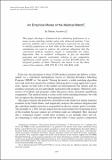An Empirical Model of the Medical Match
Author(s)
Agarwal, Nikhil
DownloadAgarwal_An empirical.pdf (720.9Kb)
PUBLISHER_POLICY
Publisher Policy
Article is made available in accordance with the publisher's policy and may be subject to US copyright law. Please refer to the publisher's site for terms of use.
Terms of use
Metadata
Show full item recordAbstract
This paper develops a framework for estimating preferences in a many-to-one matching market using only observed matches. I use pairwise stability and a vertical preference restriction on one side to identify preferences on both sides of the market. Counterfactual simulations are used to analyze the antitrust allegation that the centralized medical residency match is responsible for salary depression. Due to residents' willingness to pay for desirable programs and capacity constraints, salaries in any competitive equilibrium would remain, on average, at least $23,000 below the marginal product of labor. Therefore, the match is not the likely cause of low salaries.
Date issued
2015-07Department
Massachusetts Institute of Technology. Department of EconomicsJournal
American Economic Review
Publisher
American Economic Association
Citation
Agarwal, Nikhil. “ An Empirical Model of the Medical Match † .” American Economic Review 105, no. 7 (July 2015): 1939–1978.
Version: Final published version
ISSN
0002-8282